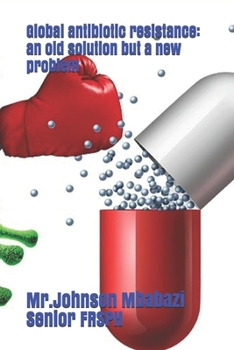Global antibiotic resistance: an old solution but a new problem
Antibiotics are medicines that prevent infections caused by bacteria. However, due to misuse and overuse of antibiotics, many bacterial strains are developing antibiotic resistance. Before Alexander Fleming discovered penicillin in 1928, there was no effective treatment for infections such as pneumonia, gonorrhoea or rheumatic fever. Fleming's discovery started off a golden age of antimicrobial research with several pharmaceutical companies developing new drugs that would save countless lives. Resistance to antimicrobials is a global problem of increasing importance. Pathogens rapidly develop mutations that render current treatments ineffective. For example, resistance to carbapenems, one of the 'last lines' of antibiotics, is widespread and has been observed in various countries; resistance to artemisinin, the gold standard in malaria treatment, has also emerged. Our current arsenal of antimicrobial agents thus has a limited lifespan and new drugs are urgently needed. Antibiotics are used to treat or prevent some types of bacterial infection. They work by killing bacteria or preventing them from spreading. But they do not work for everything. Many mild bacterial infections get better on their own without using antibiotics. Antibiotics do not work for viral infections such as colds and flu, and most coughs and sore throats. Antibiotics are no longer routinely used to treat: chest infections, ear infections in children and sore throats. When it comes to antibiotics, take your physician's advice on whether you need them or not. Antibiotic resistance is a big problem taking antibiotics when you do not require them can mean they will not work for you in the future. Concern over antibiotic resistance is growing. Resistance of up to 50% has been reported in some global regions, including resistance to carbapenems, our current last line of defence. New classes of antibiotics are needed, particularly against Gram-negative bacteria. However, even if the scientific hurdles can be overcome, it could take decades before sufficient numbers of such antibiotics become available. As an interim solution, antibiotic resistance could be 'broken' by co-administering appropriate non-antibiotic drugs with failing antibiotics. Several marketed drugs that do not currently have antibacterial indications can directly kill bacteria, reduce the antibiotic minimum inhibitory concentration when used in combination with existing antibiotics, modulate host defence through effects on host innate immunity, particularly inflammation and autophagy, or a combination of these three.
Format:Paperback
Language:English
ISBN:1706725892
ISBN13:9781706725893
Release Date:November 2019
Publisher:Independently Published
Length:42 Pages
Weight:0.20 lbs.
Dimensions:0.1" x 6.0" x 9.0"
Customer Reviews
0 rating





